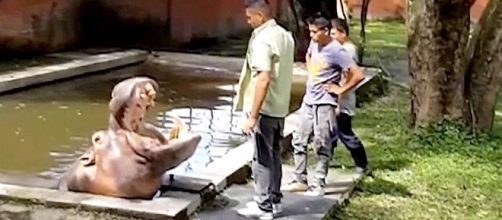The people of El Salvador have become used to public violence. The Central American country has a population of only 6 million people, yet recorded over 6,600 murders in 2015 giving it the dubious distinction of having the highest murder rate, per capital, of any country in the Western hemisphere. Yet even in a country filled with bloodshed, one killing last week has left citizens up in arms and looking for a change.
It was discovered last Thursday, February 23, that Gustavito, a beloved hippopotamus mainstay of the El Salvador National Zoo had been brutally attacked two days prior.
The extent of his injuries were not known prior, as zookeepers said he spent his time following the attack under the water in his enclosure, covered from view. It wasn't until the animal had become weakened from not eating that he was willing to leave the water to be examined.
Hippo beaten, repeatedly stabbed
During the examination Thursday, zookeepers found multiple wounds on Gustavito's body that were congruent with a severe beating with hard, blunt objects. In a statement issued by the Ministry of Culture, the hippo was found covered in "bruises, lacerations on the head and body." Multiple injuries were also found inside the mouth of the animal which were likely defensive wounds.
Gustavito was immediately taken to be seen by animal experts for treatment, but the 15-year-old hippopotamus died from his injuries on Sunday night.
Investigators looking for assailants as country mourns
An investigation has been opened, in hopes of finding the person or persons responsible for the beating of Gustavito. Investigators are hoping to find evidence amongst the metal bars and rocks found strewn around the hippo's enclosure following Tuesday's attack, but as of now the Ministry of Justice has issued no information on suspects or leads in the case.
Martin Castillo, a street vendor in the capital city of San Salvador where the zoo is located, spoke with members of the media on Monday about the loss of Gustavito and what it means to the people of El Salvador. "They kill us like flies, but this tops it all," he told reporters, adding, "They killed an animal that only entertained us."

